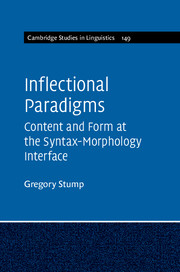Book contents
- Frontmatter
- Dedication
- Contents
- List of figures
- List of tables
- Acknowledgements
- List of abbreviations
- List of symbols and operators
- Introduction
- 1 What are inflectional paradigms?
- 2 Canonical inflectional paradigms
- 3 Morphosyntactic properties
- 4 Lexemes
- 5 Stems
- 6 Inflection classes
- 7 A conception of the relation of content to form in inflectional paradigms
- 8 Morphomic properties
- 9 Too many cells, too few cells
- 10 Syncretism
- 11 Suppletion and heteroclisis
- 12 Deponency and metaconjugation
- 13 Polyfunctionality
- 14 A theoretical synopsis and two further issues
- References
- Index
12 - Deponency and metaconjugation
Published online by Cambridge University Press: 18 December 2015
- Frontmatter
- Dedication
- Contents
- List of figures
- List of tables
- Acknowledgements
- List of abbreviations
- List of symbols and operators
- Introduction
- 1 What are inflectional paradigms?
- 2 Canonical inflectional paradigms
- 3 Morphosyntactic properties
- 4 Lexemes
- 5 Stems
- 6 Inflection classes
- 7 A conception of the relation of content to form in inflectional paradigms
- 8 Morphomic properties
- 9 Too many cells, too few cells
- 10 Syncretism
- 11 Suppletion and heteroclisis
- 12 Deponency and metaconjugation
- 13 Polyfunctionality
- 14 A theoretical synopsis and two further issues
- References
- Index
Summary
Among the most striking kinds of evidence supporting the paradigm-linkage hypothesis is the phenomenon of deponency. The classic instance of this phenomenon is that of Latin deponent verbs, whose defining feature is that their active forms inflect by means of the morphology that ordinarily serves to express a verb's passive forms; thus, a deponent verb's passive forms have “laid aside” (Latin deponere ‘lay aside’) their passive function in favor of an active function. Although Latin deponent verbs present a content–form mismatch with respect to voice, deponency in the general sense may, in principle, involve mismatches with respect to any inflectional category. Mismatches of this kind must often be seen as interface phenomena, and in the case of deponency and related marvels, the dimensions of this interface are those of the paradigm.
In this chapter, I discuss the properties of Latin deponency as canonical characteristics of the phenomenon (Section 12.1), then contrast some phenomena from Sanskrit (Section 12.2) and Kashmiri (Section 12.3) that deviate in certain respects from the example of Latin verbs. I examine a complex case from Old Norse in which deponency interacts with heteroclisis (Section 12.4), concluding in Section 12.5.
Latin deponent verbs
Latin verbs exhibit segregated conjugation classes (Section 6.2), but are traditionally classified by their imperfective conjugation, according to which there are four main conjugations, with Conjugation III subdivided into the regere-type conjugation on the one hand and the capere-type conjugation – sometimes labeled the “III (-iō) conjugation” – on the other. Transitive verbs in each conjugation inflect for both active and passive voices, as in Table 12.1. What is striking is that Latin has certain verbs – the deponent verbs – that lack synthetic forms expressing a passive meaning, but whose active forms employ the morphology that is ordinarily reserved for expressing a passive meaning. As Table 12.2 shows, deponent verbs exist in all of the imperfective conjugations; but deponency is not restricted to imperfective forms. As Tables 12.3 and 12.4 show, the perfective forms of these same verbs exhibit the same phenomenon of deponency; these forms are especially striking, because they demonstrate that the periphrastic formation typical of perfect passive forms is precisely the formation that is used in the perfect active of deponent verbs.
- Type
- Chapter
- Information
- Inflectional ParadigmsContent and Form at the Syntax-Morphology Interface, pp. 197 - 227Publisher: Cambridge University PressPrint publication year: 2015



